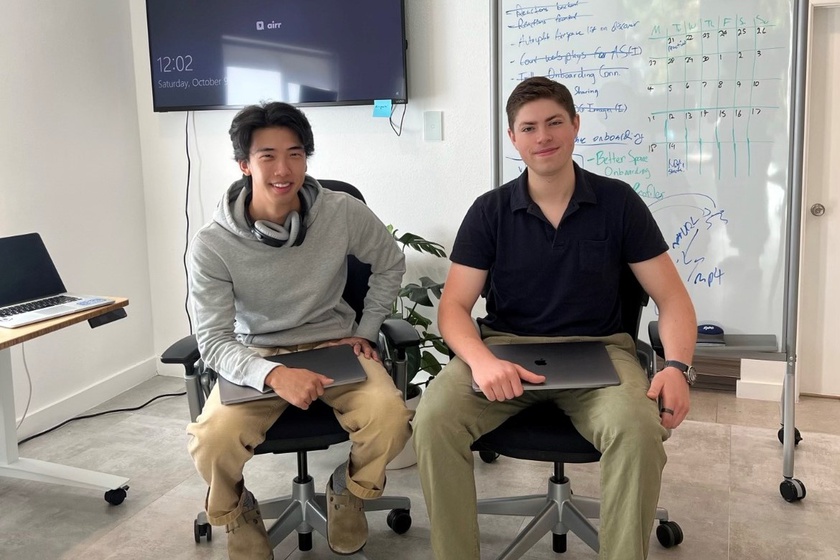{shortcode-cf66ce423d43a91ddf5682d3e1f7944f843f8cb7}
It’s a Friday afternoon in Los Angeles. Samuel T. Rukeyser and David S. Lu Zoom in from their backyard, where they’re seated in white lawn chairs. Lu, who wears a simple gray sweatshirt, leans back with his legs crossed. Rukeyser has on a T-shirt with a pair of sunglasses tucked into the neck. They look, for lack of a better word, cool — pretty close to what you’d expect from two guys who dropped out of Harvard to create their own app. In their case, the app is Airr, an audio sharing platform.
When Lu and Rukeyser first launched Airr in 2019, they envisioned an app where users could share highlights from their favorite podcasts. Both creators were longtime fans of the medium, which Rukeyser likens to “an I.V. to the brain of information and insight,” but recognized that sharing an hour-long episode was a hassle. With Airr, they sought to enable users to more easily broadcast short clips and specific insights. Similar to how you might post a tweet or a photo on other platforms, you could share audio segments (“AirrQuotes”) with your followers on Airr.
In recent months, however, Airr’s focus has shifted. Lu and Rukeyser noticed that many of their users, particularly those who created audio content, wanted a way to continue their discussions outside of the traditional podcast format. In talking to users, Rukeyser “realized that the most exciting thing we could be working on was actually helping facilitate the audio conversations themselves.”
Enter “AirrSpaces.” Introduced in June 2021, the new feature enables users to participate in asynchronous audio conversations. It functions as an audible group chat: users record themselves speaking and then send voice messages to others in a discussion thread.
“We’ve actually been working with a lot of audio creators in sports,” says Rukeyser. “People often are sharing their opinions, they’re sharing their takes on news or developments, and our format makes it very easy for them to reach their audience instantly.”
Beginning in the fall of their junior years, Lu and Rukeyser took an indefinite leave of absence in order to pursue Airr full time. They still lived near campus, which allowed them to see their blockmates.
But as Lu reflects, “A year in it became clear that it would be most helpful for us not to be in Cambridge.” He and Rukeyser decided to move to Los Angeles, which they perceive as “a much more dynamic and better environment for startups.”
While Lu and Rukeyser insist that they have no regrets about leaving school, they admit that it took some time to convince their families to support the decision.
“You have to be slightly naïve at first, because the odds are so stacked against you when you’re working on a startup, to take that leap,” says Rukeyser. “It’s definitely a different type of learning than what you get at Harvard, but it’s an intense learning experience nonetheless.”
Although Lu and Rukeyser are two-and-a-half years into the app’s journey, they are still not worried about monetization. Instead, they are more concerned with creating a positive user experience. “We’re really just focused on building [the] best creator tools,” says Lu, who heads product design. Rukeyser reaches out to creators, cultivates business relationships, and ensures user satisfaction. The Airr team also includes Ivraj S. Seerha ’19 and Noah C. Putnam ’19, who contribute to product design and engineering.
Throughout their creative journey, Lu and Rukeyser have learned several key lessons. Lu says the most important is that “the best and fastest way of learning is really just by doing, by building the products, talking to the users, and iterating on it.” Rukeyser adds that the duo have made plenty of mistakes, but he believes that lessons learned from these setbacks will eventually aid Airr’s growth and progress.
Despite their success with the Airr app, Lu and Rukeyser are hesitant to give blanket advice to those interested in dropping out and pursuing their own startups. They acknowledge that the decision to leave school depends on different personal circumstances, but Lu suggests that students simply explore their entrepreneurial ideas and determine whether “it’s worthwhile to you as something you want to pursue further.” As Rukeyser muses, “we’re both doing what we probably would have been doing post-grad anyways, so we just cut to the chase a little bit.”


